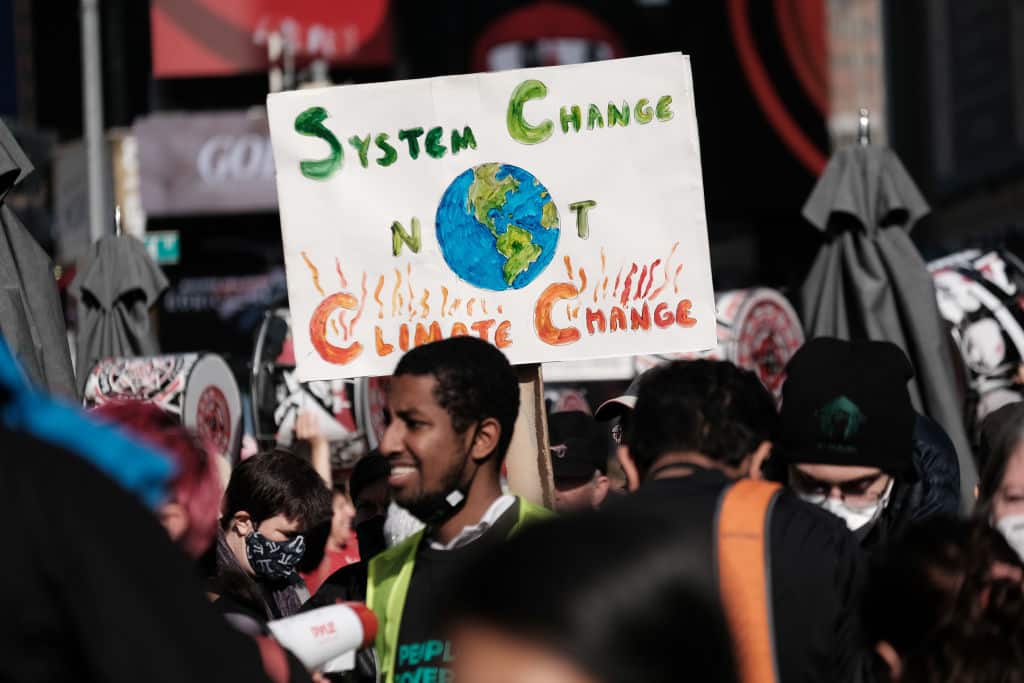Products You May Like
Society is currently changing too slowly to limit global warming to 1.5 degrees Celsius above pre-industrial levels. Spencer Platt / Getty Images
 Why you can trust us
Why you can trust us
Founded in 2005 as an Ohio-based environmental newspaper, EcoWatch is a digital platform dedicated to publishing quality, science-based content on environmental issues, causes, and solutions.
If current trends continue, world leaders are unlikely to succeed in limiting global warming to 1.5 degrees Celsius above pre-industrial levels and avoiding the worst impacts of the climate crisis, but the reason isn’t a lack of technological innovation or encroaching climatological tipping points.
Instead, the second annual Hamburg Climate Futures Outlook from the University of Hamburg’s Cluster of Excellence “Climate, Climatic Change, and Society” (CLICCS) concluded that society is changing too slowly to meet the reach goal of the Paris agreement.
“Actually, when it comes to climate protection, some things have now been set in motion. But if you look at the development of social processes in detail, keeping global warming under 1.5 degrees still isn’t plausible,” CLICCS Speaker Prof. Anita Engels said in a press release.
The goal of the report was to assess whether meeting the Paris agreement goals of limiting global warming to well below two degrees Celsius above pre-industrial levels–or ideally 1.5 degrees–were actually plausible given social and environmental factors. The final result was the work of more than 60 natural and social scientists looking at data from more than 140 countries, according to the University of Hamburg and The Hill.
The study authors looked at 10 social drivers that could lead to “deep decarbonization” by 2050, which is necessary to achieve the 1.5 goal. These were UN climate governance, transnational initiatives, climate-related regulations, climate litigation, climate protests and social movements, knowledge production, fossil-fuel divestment, media, consumption patterns and corporate responses. They found that, while the first seven were moving in the right direction, none of them were advancing fast enough to achieve deep decarbonization. Media was “ambivalent” while corporate responses and consumption patterns were still actively standing in the way of climate action. However, Engels acknowledged that consumers are often dependent on the decisions of businesses and the governments that chose to regulate them (or not.)
“It would be so much easier if the way the products are produced is regulated in a way that (consumers) are not forced to buy climate destructive products,” she told AFP.
The study authors also concluded that economic recovery efforts following the coronavirus lockdowns had led to greater dependence on fossil fuels, while the effects of Russia’s invasion of Ukraine were still unknown.
The researchers also looked at physical drivers of climate change that can cause tipping points leading to even more warming. They found that the melting of the polar ice sheets, sea ice decline and regional climate change and variability had minimal effects on temperature and therefore were not relevant to the Paris agreement goals. The thawing of the permafrost, the deforestation of the Amazon rainforest and the destabilization of the Atlantic Meridional Overturning Circulation could make it slightly less likely that the Paris agreement goals would be achieved, but had less of an impact in the near term than the social factors.
“The Fact is: these feared tipping points could drastically change the conditions for life on Earth – but they’re largely irrelevant for reaching the Paris Agreement temperature goals,” CLICCS Co-Speaker Prof. Jochem Marotzke of the Max Planck Institute for Meteorology said in the press release.
The study authors were more optimistic about the chances of limiting global warming to below two degrees.
“Meeting the 1.5°C Paris Agreement temperature goal is not plausible, but limiting the global temperature rise to well below 2°C can become plausible if ambition, implementation, and knowledge gaps are closed,” they concluded.
The Hamburg study is the second this week to suggest that the 1.5 goal may be out of reach. Another paper from Stanford University researchers used artificial intelligence to conclude that temperatures are 10 to 15 years away from rising more than 1.5 degrees higher. However, two climate scientists unaffiliated with either paper said that 1.5 was not out of reach. Bill Hare of Climate Analytics told AP News that temperatures could be kept below 1.5 degrees warmer with a small overshoot if emissions were halved by 2030. Michael Mann of the University of Pennsylvania, meanwhile, warned that giving up on the 1.5-degree goal could become a “self-fulfilling prophecy.”
“In the end it’s easy to overinterpret the significance of a precise threshold like 1.5C warming. The challenge is to limit warming as much as possible,” he said.
Learn More About Energy Solutions From EcoWatch
And, ultimately, the plausibility assessed by the Hamburg study is based on the maintenance of current social trends.
“Even if the results of our driver assessments suggest that societal transformation cannot be achieved easily, human agency still has a large potential to shape the way climate futures will evolve,” the authors wrote.
Temperature rise could still be limited to 1.5 degrees if Russia ends its invasion of Ukraine and the U.S. and China improve their relationship, paving the way for more productive international negotiations. At the same time, climate activism and popular pressure are needed to convince governments and polluting companies to drastically cut their reliance on fossil fuels.
“We need to do so much more,” Engels told AFP.
Subscribe to get exclusive updates in our daily newsletter!
By signing up, you agree to the Terms of Use and Privacy Policy & to receive electronic communications from EcoWatch Media Group, which may include marketing promotions, advertisements and sponsored content.
